-
 Bitcoin
Bitcoin $83,301.7640
-2.11% -
 Ethereum
Ethereum $1,799.9842
-4.25% -
 Tether USDt
Tether USDt $0.9999
0.00% -
 XRP
XRP $2.0278
-4.59% -
 BNB
BNB $596.2228
-1.03% -
 USDC
USDC $1.0001
0.01% -
 Solana
Solana $116.8645
-7.35% -
 Dogecoin
Dogecoin $0.1617
-6.43% -
 Cardano
Cardano $0.6450
-5.42% -
 TRON
TRON $0.2321
-2.68% -
 Toncoin
Toncoin $3.6664
-9.62% -
 UNUS SED LEO
UNUS SED LEO $9.4145
0.16% -
 Chainlink
Chainlink $12.8328
-5.91% -
 Stellar
Stellar $0.2589
-3.37% -
 Avalanche
Avalanche $18.1600
-6.54% -
 Sui
Sui $2.2723
-8.51% -
 Shiba Inu
Shiba Inu $0.0...01214
-1.89% -
 Hedera
Hedera $0.1611
-4.12% -
 Litecoin
Litecoin $82.9489
0.17% -
 Polkadot
Polkadot $3.9725
-3.23% -
 MANTRA
MANTRA $6.2949
0.51% -
 Bitcoin Cash
Bitcoin Cash $302.6917
-1.17% -
 Bitget Token
Bitget Token $4.5396
-1.25% -
 Dai
Dai $1.0000
0.00% -
 Ethena USDe
Ethena USDe $0.9998
-0.01% -
 Pi
Pi $0.6249
-7.33% -
 Monero
Monero $213.0395
-1.33% -
 Hyperliquid
Hyperliquid $11.5526
-14.44% -
 Uniswap
Uniswap $5.9462
-2.98% -
 Aptos
Aptos $5.2007
-2.20%
Why can blockchain solve the trust problem?
Blockchain solves trust issues through decentralization, transparency, and cryptographic security, enabling direct transactions without intermediaries across various sectors.
Apr 02, 2025 at 12:07 am
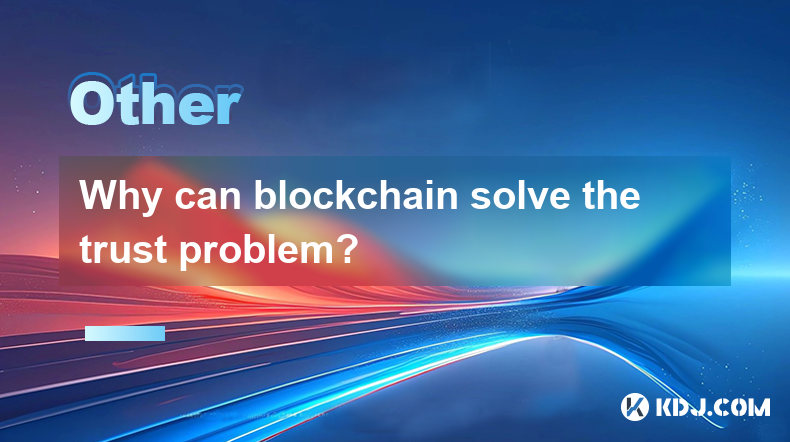
Blockchain technology has emerged as a revolutionary solution to the trust problem that plagues many traditional systems. At its core, blockchain is a decentralized and distributed digital ledger that records transactions across numerous computers. This structure ensures that no single entity has control over the entire network, thereby reducing the risk of manipulation and fraud. The trust problem arises when parties need to rely on intermediaries or centralized authorities to validate transactions. Blockchain eliminates the need for such intermediaries by using cryptographic means to secure and verify transactions, fostering a trustless environment where participants can transact directly with one another.
Decentralization and Trust
One of the primary reasons blockchain can solve the trust problem is its decentralized nature. In traditional systems, trust is often placed in a central authority, such as a bank or government, to oversee and validate transactions. This centralization creates a single point of failure and potential for corruption. Blockchain, on the other hand, distributes the control and validation process across a network of nodes. Each node in the network maintains a copy of the ledger, and consensus mechanisms ensure that all nodes agree on the state of the ledger. This decentralized approach reduces the risk of a single entity manipulating the system, thereby enhancing trust among participants.
Transparency and Immutability
Blockchain's transparency and immutability are crucial in building trust among users. Every transaction recorded on the blockchain is visible to all participants, ensuring that there is no hidden activity. This transparency allows users to verify transactions independently, reducing the need to trust a third party. Additionally, once a transaction is recorded on the blockchain, it cannot be altered or deleted. This immutability is achieved through cryptographic hashing, where each block contains a hash of the previous block, creating a chain of blocks that is extremely difficult to tamper with. The combination of transparency and immutability ensures that the data on the blockchain is reliable and trustworthy.
Cryptographic Security
Cryptography plays a vital role in ensuring the security and trustworthiness of blockchain. Each transaction on the blockchain is secured using cryptographic algorithms, which ensure that only authorized parties can access and modify the data. Public-key cryptography, for instance, allows users to have a pair of keys: a public key for receiving transactions and a private key for signing transactions. This system ensures that transactions can be verified by anyone on the network, but only the owner of the private key can initiate a transaction. The use of cryptographic techniques not only secures the data but also builds trust by ensuring that transactions are authentic and verifiable.
Consensus Mechanisms
Consensus mechanisms are another critical component of blockchain that helps solve the trust problem. These mechanisms ensure that all nodes in the network agree on the state of the ledger, preventing any single node from altering the data unilaterally. There are various consensus mechanisms, such as Proof of Work (PoW) and Proof of Stake (PoS), each with its own method of achieving consensus. PoW, used by Bitcoin, requires nodes to solve complex mathematical problems to validate transactions, while PoS, used by Ethereum 2.0, selects validators based on the number of coins they hold and are willing to "stake" as collateral. These mechanisms ensure that the network remains secure and trustworthy, as any attempt to manipulate the ledger would require control over a majority of the network's computing power or stake.
Smart Contracts and Trust
Smart contracts are self-executing contracts with the terms of the agreement directly written into code. They run on blockchain platforms like Ethereum and automate the execution of agreements between parties, reducing the need for intermediaries. By automating contract execution, smart contracts minimize the risk of human error and fraud, thereby enhancing trust. For instance, a smart contract can automatically release funds to a seller once certain conditions are met, without requiring a third party to oversee the transaction. This automation and transparency build trust by ensuring that all parties adhere to the agreed-upon terms without the possibility of manipulation.
Real-World Applications and Trust
Blockchain's ability to solve the trust problem is evident in its various real-world applications. In the financial sector, blockchain enables faster and more secure cross-border payments, reducing the need for banks to act as intermediaries. In supply chain management, blockchain provides a transparent and immutable record of product journeys, ensuring that all parties can trust the authenticity and origin of goods. In healthcare, blockchain can securely store and share patient data, ensuring that sensitive information is only accessible to authorized parties. These applications demonstrate how blockchain's features—decentralization, transparency, immutability, and cryptographic security—work together to build trust in diverse sectors.
Challenges and Limitations
While blockchain offers significant advantages in solving the trust problem, it is not without its challenges and limitations. Scalability remains a major issue, as many blockchain networks struggle to handle a high volume of transactions efficiently. Additionally, the energy consumption associated with some consensus mechanisms, like Proof of Work, raises environmental concerns. Regulatory uncertainty also poses a challenge, as governments and institutions grapple with how to integrate blockchain into existing legal frameworks. Despite these challenges, ongoing research and development are aimed at addressing these issues, further enhancing blockchain's ability to solve the trust problem.
Future Prospects
The future of blockchain in solving the trust problem looks promising. As technology continues to evolve, new solutions are being developed to address current limitations. For instance, layer-two scaling solutions like the Lightning Network for Bitcoin aim to increase transaction throughput without compromising security. Similarly, advancements in consensus mechanisms, such as the transition from Proof of Work to Proof of Stake in Ethereum, are expected to reduce energy consumption and improve scalability. As these innovations come to fruition, blockchain's role in fostering trust across various industries is likely to grow, making it an increasingly integral part of our digital infrastructure.
Common Questions and Answers
What is blockchain and how does it work?
Blockchain is a decentralized and distributed digital ledger used to record transactions across numerous computers. It works by grouping transactions into blocks, which are then linked together using cryptographic hashes, forming a chain of blocks. Each block contains a list of transactions, a timestamp, and a reference to the previous block, ensuring the integrity and immutability of the data.How does blockchain ensure trust?
Blockchain ensures trust through its decentralized nature, transparency, immutability, cryptographic security, and consensus mechanisms. By distributing control across a network of nodes, ensuring all transactions are visible and unalterable, securing data with cryptography, and using consensus to validate transactions, blockchain creates a trustless environment where participants can transact directly without intermediaries.What are smart contracts and how do they enhance trust?
Smart contracts are self-executing contracts with the terms directly written into code, running on blockchain platforms. They enhance trust by automating the execution of agreements, reducing the risk of human error and fraud. By ensuring that all parties adhere to the agreed-upon terms without the possibility of manipulation, smart contracts build trust in transactions.What are some real-world applications of blockchain in solving trust issues?
Blockchain is used in various sectors to solve trust issues. In finance, it enables secure and fast cross-border payments. In supply chain management, it provides a transparent record of product journeys. In healthcare, it securely stores and shares patient data. These applications demonstrate how blockchain's features build trust in diverse industries.What are the challenges and limitations of blockchain in solving the trust problem?
Challenges and limitations include scalability issues, high energy consumption associated with some consensus mechanisms, and regulatory uncertainty. Despite these, ongoing research and development aim to address these issues, enhancing blockchain's ability to solve the trust problem.What are the future prospects of blockchain in solving the trust problem?
The future of blockchain looks promising with ongoing innovations aimed at addressing current limitations. Layer-two scaling solutions, advancements in consensus mechanisms, and other technological developments are expected to enhance blockchain's role in fostering trust across various industries, making it an increasingly integral part of our digital infrastructure.
Disclaimer:info@kdj.com
The information provided is not trading advice. kdj.com does not assume any responsibility for any investments made based on the information provided in this article. Cryptocurrencies are highly volatile and it is highly recommended that you invest with caution after thorough research!
If you believe that the content used on this website infringes your copyright, please contact us immediately (info@kdj.com) and we will delete it promptly.
- Sentient Launches Open-Source Deep Search (ODS), a New Era for Artificial Intelligence
- 2025-04-03 18:45:13
- Qubetics ($TICS), ImmutableX, and Filecoin Are Top 3 Cryptos to Buy in 2025
- 2025-04-03 18:45:13
- Bitcoin Market Momentum Stalled After US President Donald Trump Announced New Tariffs
- 2025-04-03 18:40:12
- Game Development Firm Enish Buys the Dip, Investing ¥100M in Bitcoin
- 2025-04-03 18:40:12
- The Memecoin Market Continues to Draw In Capital from Both Retail and Institutional Investors
- 2025-04-03 18:35:13
- The Erstwhile-Popular Memecoin, $PWEASE, Finds Its Market Cap and Holder Base Sinking
- 2025-04-03 18:35:13
Related knowledge

What are the future development trends of blockchain game development?
Apr 03,2025 at 05:00am
Blockchain technology has revolutionized various industries, and gaming is no exception. As we look to the future, several trends are set to shape the development of blockchain games. These trends not only promise to enhance the gaming experience but also to integrate blockchain technology more seamlessly into the gaming ecosystem. Let's explore these t...

What are the maintenance costs of blockchain system development?
Apr 03,2025 at 06:07pm
The maintenance costs of blockchain system development are multifaceted and depend on various factors. These costs can include technical maintenance, security updates, infrastructure expenses, and personnel costs. Understanding these elements is crucial for anyone planning to develop or maintain a blockchain system. Technical MaintenanceTechnical mainte...
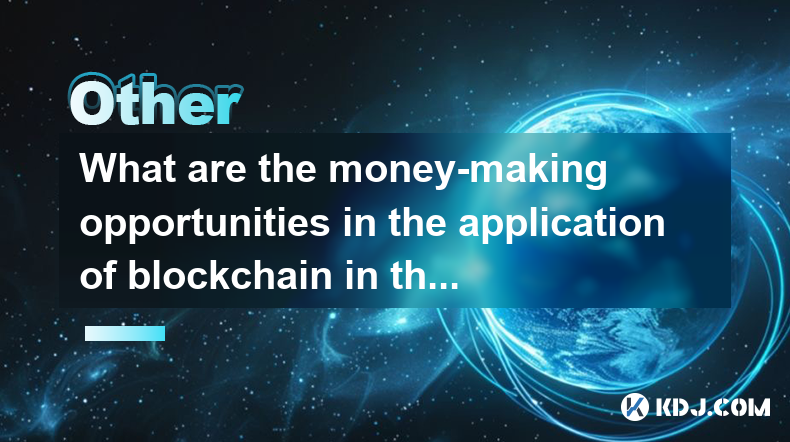
What are the money-making opportunities in the application of blockchain in the medical industry?
Apr 03,2025 at 03:35am
The integration of blockchain technology into the medical industry presents a myriad of money-making opportunities that can revolutionize healthcare systems. Blockchain's inherent characteristics, such as transparency, security, and immutability, make it an ideal solution for various medical applications. By leveraging blockchain, companies can develop ...
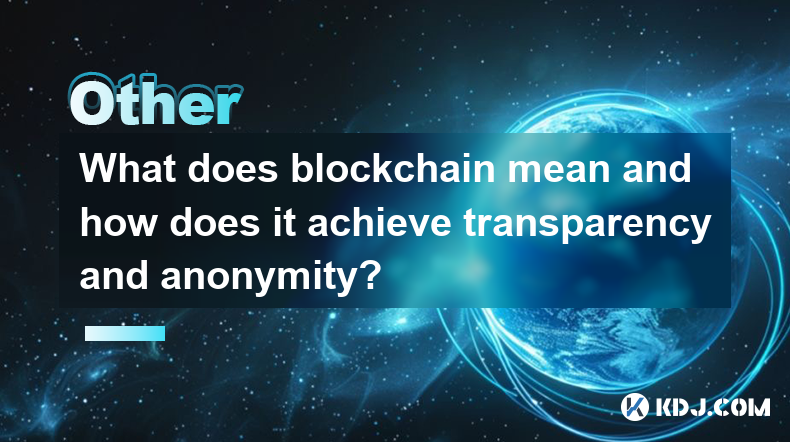
What does blockchain mean and how does it achieve transparency and anonymity?
Apr 03,2025 at 11:28am
Blockchain technology is a decentralized, distributed ledger that records transactions across numerous computers. It ensures that once data is recorded, it cannot be altered retroactively without the alteration of all subsequent blocks and the consensus of the network. This technology underpins cryptocurrencies like Bitcoin and Ethereum, providing a sec...
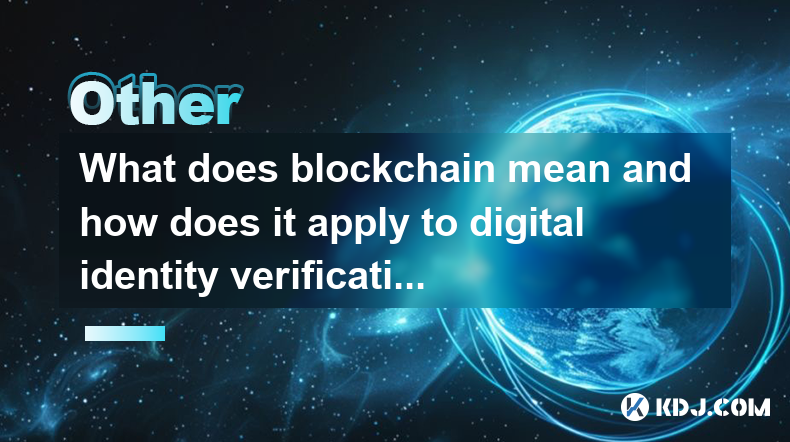
What does blockchain mean and how does it apply to digital identity verification?
Apr 03,2025 at 02:21am
Blockchain technology, at its core, is a decentralized and distributed digital ledger used to record transactions across numerous computers. This ensures that the recorded data cannot be altered retroactively without the alteration of all subsequent blocks and the consensus of the network. The concept of blockchain was initially devised for the digital ...
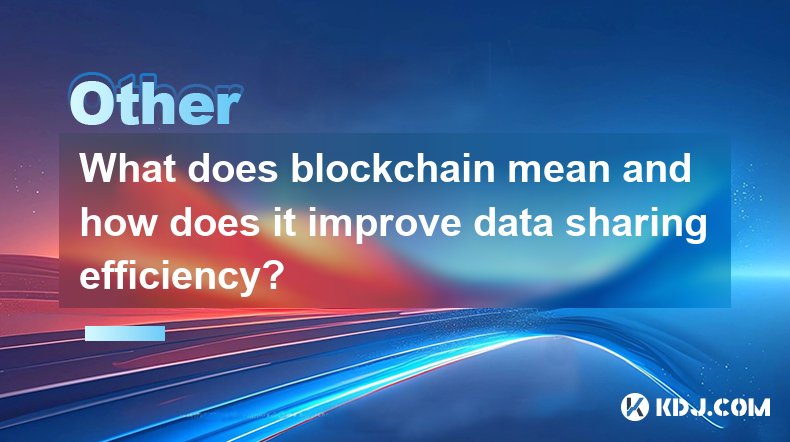
What does blockchain mean and how does it improve data sharing efficiency?
Apr 03,2025 at 03:15pm
Blockchain is a decentralized and distributed digital ledger technology that records transactions across numerous computers. This technology ensures that once data is recorded, it cannot be altered retroactively without the alteration of all subsequent blocks and the consensus of the network. This characteristic makes blockchain highly secure and transp...

What are the future development trends of blockchain game development?
Apr 03,2025 at 05:00am
Blockchain technology has revolutionized various industries, and gaming is no exception. As we look to the future, several trends are set to shape the development of blockchain games. These trends not only promise to enhance the gaming experience but also to integrate blockchain technology more seamlessly into the gaming ecosystem. Let's explore these t...

What are the maintenance costs of blockchain system development?
Apr 03,2025 at 06:07pm
The maintenance costs of blockchain system development are multifaceted and depend on various factors. These costs can include technical maintenance, security updates, infrastructure expenses, and personnel costs. Understanding these elements is crucial for anyone planning to develop or maintain a blockchain system. Technical MaintenanceTechnical mainte...

What are the money-making opportunities in the application of blockchain in the medical industry?
Apr 03,2025 at 03:35am
The integration of blockchain technology into the medical industry presents a myriad of money-making opportunities that can revolutionize healthcare systems. Blockchain's inherent characteristics, such as transparency, security, and immutability, make it an ideal solution for various medical applications. By leveraging blockchain, companies can develop ...

What does blockchain mean and how does it achieve transparency and anonymity?
Apr 03,2025 at 11:28am
Blockchain technology is a decentralized, distributed ledger that records transactions across numerous computers. It ensures that once data is recorded, it cannot be altered retroactively without the alteration of all subsequent blocks and the consensus of the network. This technology underpins cryptocurrencies like Bitcoin and Ethereum, providing a sec...

What does blockchain mean and how does it apply to digital identity verification?
Apr 03,2025 at 02:21am
Blockchain technology, at its core, is a decentralized and distributed digital ledger used to record transactions across numerous computers. This ensures that the recorded data cannot be altered retroactively without the alteration of all subsequent blocks and the consensus of the network. The concept of blockchain was initially devised for the digital ...

What does blockchain mean and how does it improve data sharing efficiency?
Apr 03,2025 at 03:15pm
Blockchain is a decentralized and distributed digital ledger technology that records transactions across numerous computers. This technology ensures that once data is recorded, it cannot be altered retroactively without the alteration of all subsequent blocks and the consensus of the network. This characteristic makes blockchain highly secure and transp...
See all articles























































































